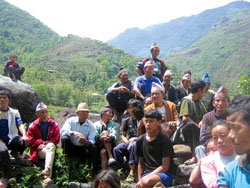|
|
| PLENTY TO SAY: Villagers in Taphetok VDC, Taplejung, gather to meet the UN's IDP mission in May. |
The ceasefire and recent political progress towards peace have allowed thousands of internally displaced Nepalis to start thinking seriously about returning home.
Many will face the initial hurdle of getting approval from the Maoists who forced their exit in the first place. And if they clear that bar, another challenge awaits: will they have the resources to reestablish their lives?
Human rights group INSEC has repatriated 357 IDPs so far, with support from ActionAid, DfID and the UN's humanitarian affairs office (OCHA). Twenty each went home to Rautahat and Sindhupalchok while INSEC resettled 317 people from midwest centres, delivering 142 to Jumla last year and 26 to Bajura and 149 to Dailekh last month.
Each member of those families received Rs 3,000 to buy food. "Their major problem is land," INSEC's Rupesh Nepal told us. "For two or three years no one has been cultivating so they lack the seasonal foods that they need for survival." Otherwise the returnees will be on their own, getting a follow-up visit from human rights groups only after three months.
Members of a recent mission to eight eastern districts returned alarmed by what they saw. "The conditions for return are really not there for several reasons," Bjorn Pettersson of the UN's Nepal human rights office (OHCHR) told us. One problem was intimidation by local Maoists, despite the rebel leaders' pledge to allow IDPs safe return home.
Other impediments were the lack of state support and the absence of homes and farms. "We saw several IDP houses that were abandoned-they would need repairs," said OCHA's IDP adviser, Hanne Melfald. Some locals said they would be willing to care for their returning neighbours initially. Others told the mission "we can't really support them".
IDPs' other practical needs might include farming tools and seed, said Pettersson, who added: "The district authorities need to be taking the lead to provide them some sort of support."
The UN's mission last month included 15 people who travelled on foot and by vehicle for nearly two weeks to assess the situation in the region, visiting some VDCs that hadn't seen international workers during a decade of conflict. They found that one or two displaced families from each VDC had ventured home but many other people indicated they were waiting for signs of stability after the Maoists' ceasefire expires in July.
The team's rough guess is that an average of 30 individuals left each VDC during the conflict. Estimates of the number of IDPs countrywide vary widely. UNHCR suggested 200,000 in a document last month while the INGO Caritas said 350,000 when it appealed for $1 million to help the displaced in February.
In its Supplementary Appeal, UNHCR critiqued state inaction. 'The government has committed itself to assist and compensate this population, without having the resources, and capacity to actually do so. As a result, many of their material, legal and psychological needs have not been addressed.' Another UN inter-agency mission, to western Nepal in December 2005, concluded: 'The majority of displaced in Nepal are not officially recognised as such by the state and at present there are few measures in place to monitor and ensure that their rights and basic protection concerns are met.'
INSEC is working to repatriate other IDPs in the midwest but this is piecemeal because of inconsistent funding and planning. "Until the government takes the initiative there can't be an overall plan so it's up to the NGOs and INGOs," explains Nepal.
Everyone's major concern is assuring security for IDPs' trips home and resettlement but getting people home includes a lengthy process of obtaining permission from the rebels' district leaders.
"Each district is different," says Nepal. "In some places the Maoists are softer, they want to be seen respecting human rights...but they still have not let some people return-those who have killed one of their members, acted as spies or committed crimes."
UNHCR IDP Plan 2006*:
Proposed activities:
- Protection and monitoring
- Guidance on registration
- Legal representation
- Counselling/Information
- Accommodation/Basic needs
- Preventing sexual/gender-based violence
- Emergency Shelter
BUDGET - $2.4 million
*Partners: Ministry of Home,
Ministry of Local
Development, OCHA, OHCHR, UNICEF, UNDP, IFRC, ICRC, Norwegian Refugee Council, Lutheran World Federation, NGOs and communities



